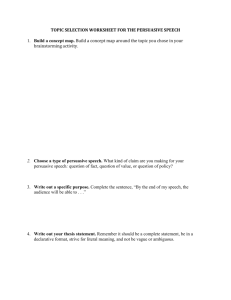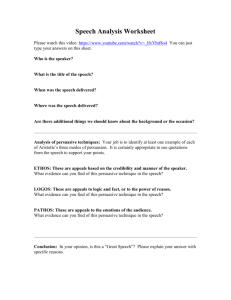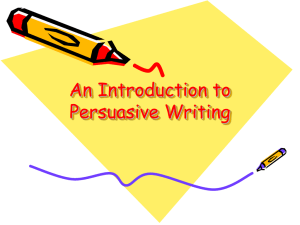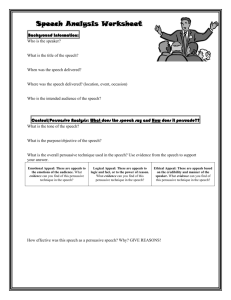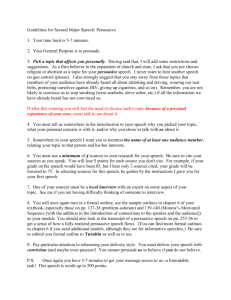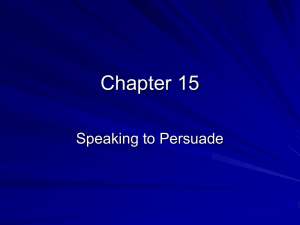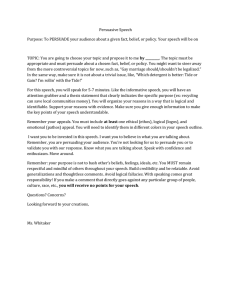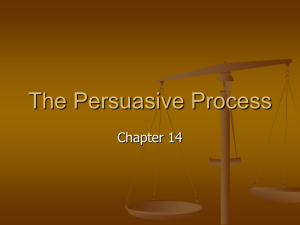Class 9 - Writing - Delivering Your Speech
advertisement
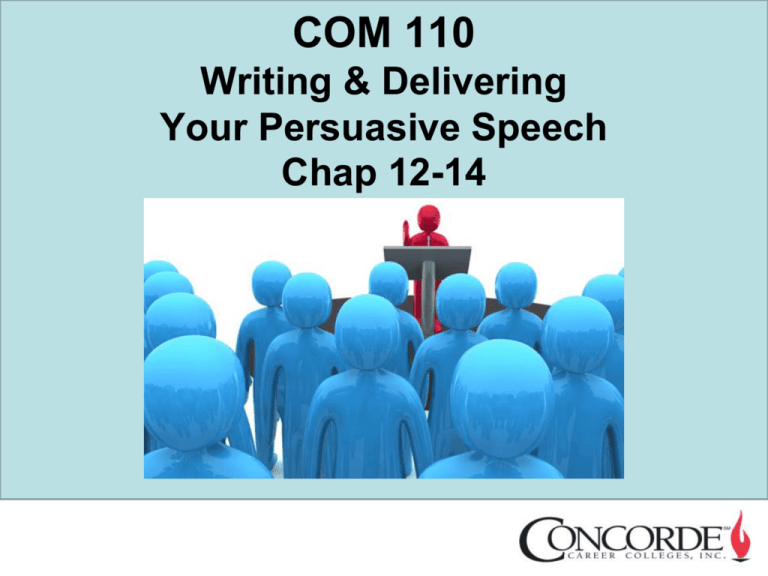
COM 110 Writing & Delivering Your Persuasive Speech Chap 12-14 Agenda (7.14) Speech Evaluation Forms - Review Chap 14 – Persuasive Speech Chap 12 & 13 – Speech Prep & Delivery In Class Assignment – Speech Outline Review Part #1 – Final Exam Types of Persuasive Speeches • Questions of Fact – to persuade listeners that something is true or false • Questions of Value – to persuade listeners in the value of something, that something is good, moral or just • Questions of Policy – to persuade listeners that this is the policy to adopt or not adopt What Type is your Persuasive Speech? 1. The 10 Steps for Preparing an Effective Speech Select a topic, purpose, thesis 2. Analyze your audience 3. Research your topic 4. Collect supporting materials 5. Develop main points 6. Organize speech materials 7. Word your speech 8. Construct conclusion, introduction, transitions and outline 9. Rehearse your speech –at home 10. Deliver your speech – in class on 7.21 Collect Supporting Materials • For persuasive speech, your support is your proof – material that offers evidence, argument and motivational appeal and that establishes your credibility and reputation Types of Support to Persuade Your Audience • Logical Appeals – Reasoning from specific instances and from general principles, causes and effects, signs • Emotional Appeals – Appeals to audience’s emotions and to their desires for status, financial gain, or increased self-esteem • Credibility Appeals – Establishing your own personal reputation or credibility, especially your competence, high moral character and charisma Ethos, Pathos, Logos What Appeal (s) can you use in your speech? Develop Main Points • 3 Main Points – usually in order of most important to least important • Each point should have 2-3 supporting materials/evidence Organize Speech: Motivate Sequence • • • • Gain attention – grabbing opener, question Need – what is the need for change – problem Satisfaction – advance proposal to satisfy need Visualization – what would things be like with change • Action – what do you want audience to do – change attitude, behavior, protest, etc. Organize Speech: Problem-Solution • Divides speech into 2 main parts: Problem and solution – ex. 3 major problems with home health care. 3 major solutions Other Org Patterns: • Claim & Proof Pattern • Cause & Effect What Organizational Pattern works best with your speech? Word Your Speech: • • • • • • Clarity Vividness Appropriateness Personal Style Power Sentence Construction The Introduction • Gain Attention – – – – Ask a question Refer to specific audience members Refer to specific context/relevance of your topic Use illustrations or dramatic or humorous stories • Orient the Audience – Give the audience an idea about your subject – Identify the goal you hope to achieve The Conclusion • Summarize – Restate your thesis – Restate the importance of your thesis – Restate your main points • Close – Pose a challenge or question – Motivate your audience to do something In-Class Assignment: • Work on Speech Outline – pg 246 – 30 minutes • One on ones – 5 minutes Methods of Delivery: • Impromptu • Manuscript • Extemporaneous – Memorize opening and closing lines – Memorize main points and order you will present them – Rehearse and time speech Goals of Persuasive Speech: • Strengthen or Weaken attitudes, beliefs or values • Change attitudes, beliefs or values • Motivate your audience to take action The Persuasion Continuum Discussion/Homework Week #9 • • • • Complete Quizzes Modules 8 & 9 Critique a speech – next class Finalize Speech – delivery outline Practice, practice, practice – in shower, friends, dogs, cats, etc. Next Steps • Last class – next week: o Persuasive speeches! o Review for Final Key Word Review Final Exam – Part 1
